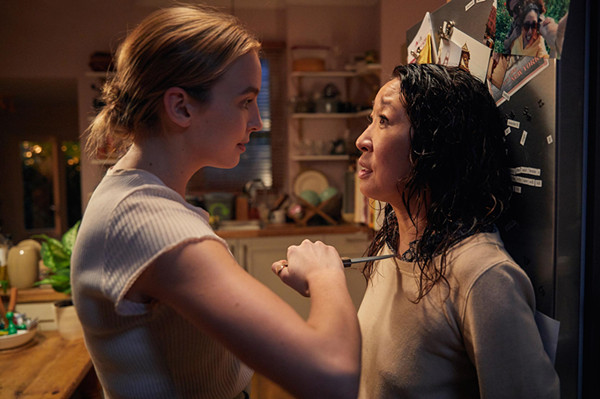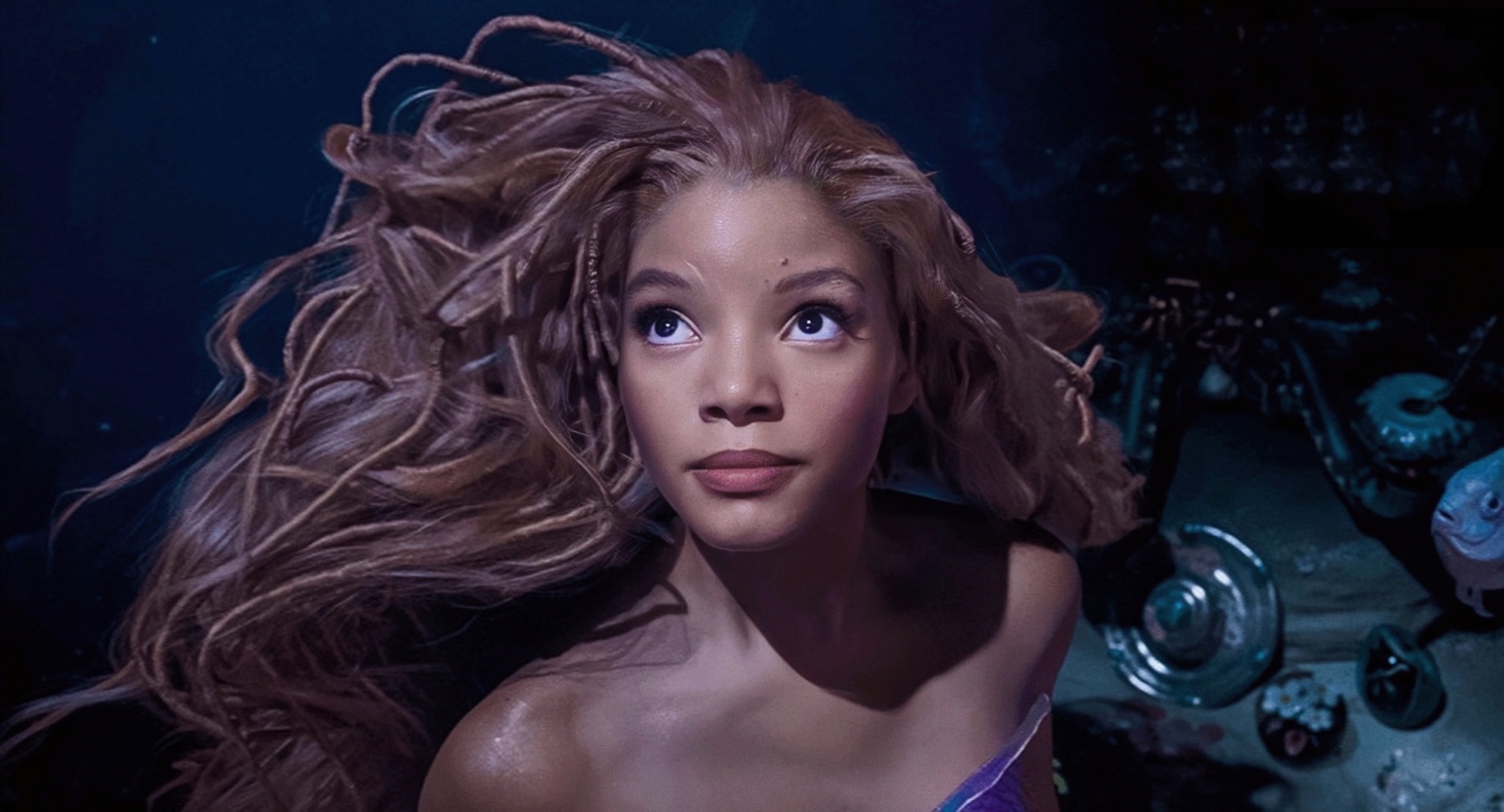
This article contains serious spoilers
With the blessing of new technology and new media, how human nature goes bad step by step until it is completely defeated has always been the core of the story of "Black Mirror". After an impressive first season, it dedicates several dark fables each season, and is now in its sixth season.
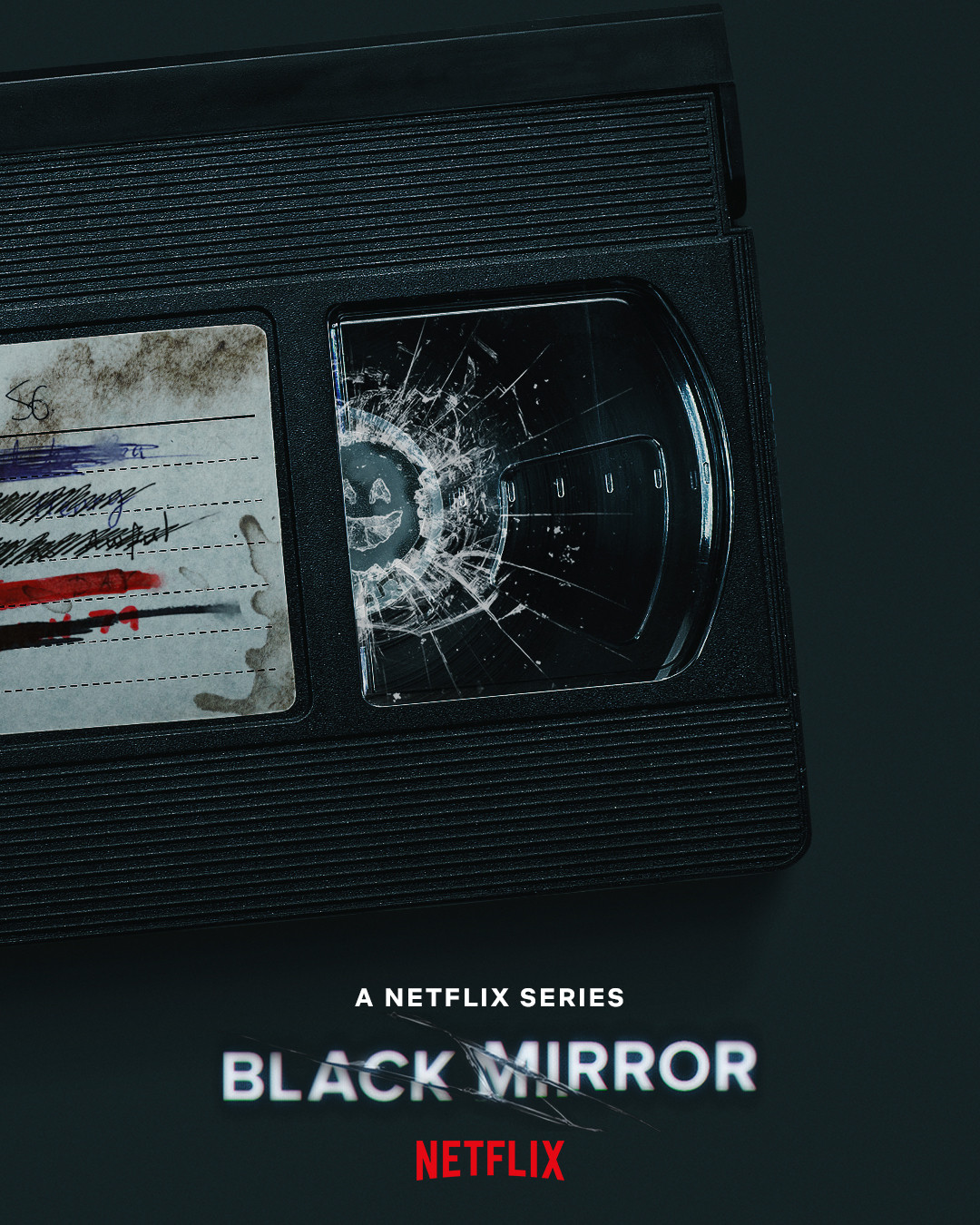
"Black Mirror" poster
It is also a black story series that can be filmed continuously, "Black Mirror" is more entertaining and entertaining, and has the ambition to ring the death knell. Unlike "Inside No. 9" (Inside No. 9) next door, it has no baggage and only concentrates on telling stories about good things that are hopelessly bad. This difference in creative intent makes almost every story in "Secret No. 9" wonderful, and the quality is always stable in the degree of control over length and subtlety of technique, and it will never make people think of fast forwarding.
The quality of "Black Mirror" has always been mixed. The best "Black Mirror" is like a broken mirror, showing endless images. The repressed part of human nature is released and fissioned, and the fear of not being able to distinguish between reality and virtuality is awakened from the subconscious, forcing the audience to stop to take a breath and think about their current situation.
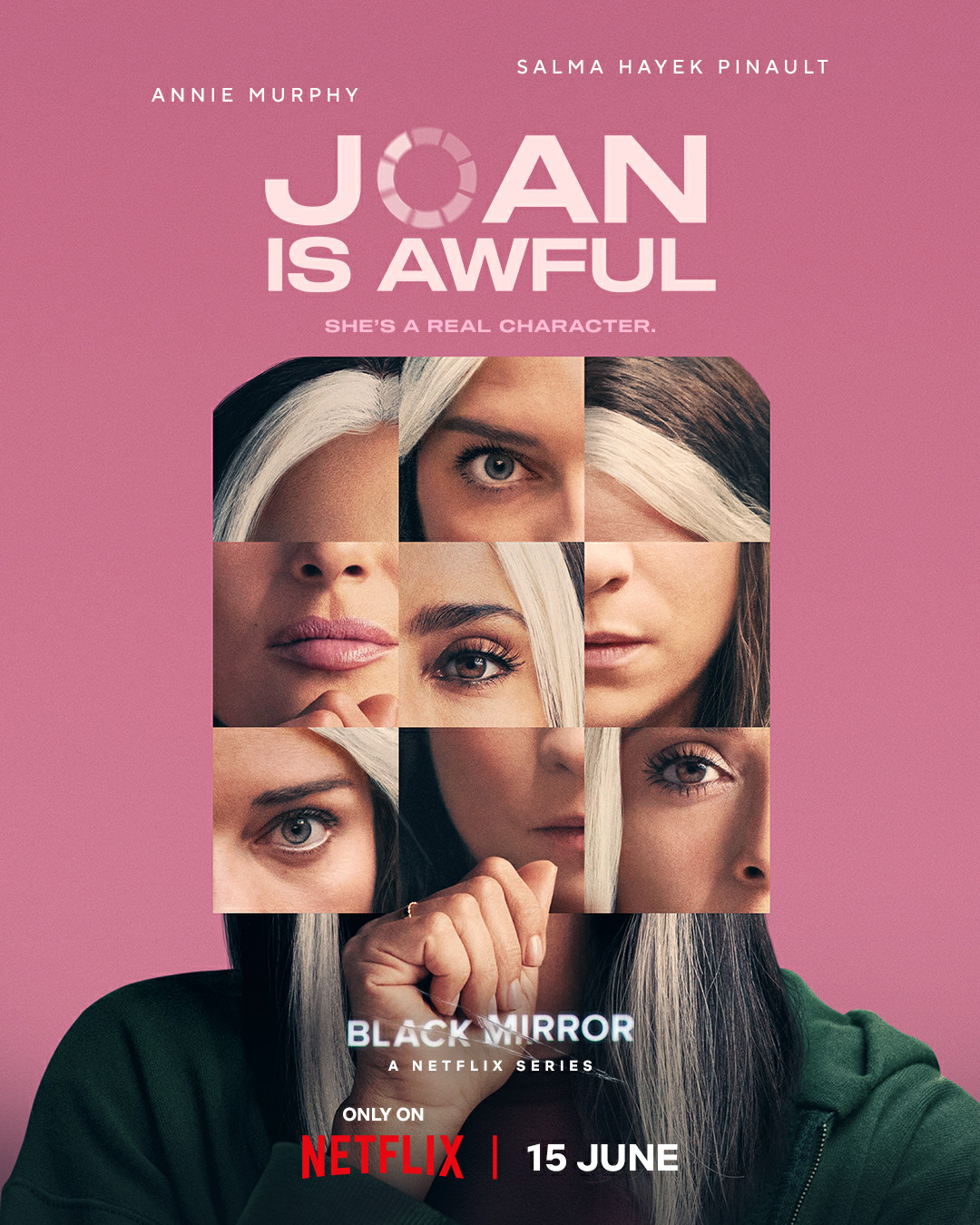
Episode 1 "Joan Sucks" Poster
This season, the first episode, "Joan Sucks," lives up to that standard. An ordinary person, Joan, turned on the streaming media "Streamberry" one day and found a drama called "Joan sucks". She and her boyfriend clicked on it and found that "Joan", played by Selma Hayek, completely reproduced her life. Her daily life is clearly seen on the screen (the behavior is even more exaggerated), and people around her are talking about it. Regardless of Joan's struggles, the episodes continue to unfold, with daily updates on her declining life.
The law can do nothing, because when Joan bought the mobile phone, she signed the terms of agreeing to make her life into a film and television drama. Selma Hayek, the actor who authorized the platform to use her own face and was automatically generated by the system to "play" Joan, also regretted it, but even she couldn't let the episode go offline. So Joan and Hayek team up to break into Streamberry's headquarters, trying to destroy the heart of the show -- a quantum computer that generates plots in real time.

Episode 1 "Joan Sucks" Stills
Clearly, Streamberry is a parody of Netflix itself, the creator of Black Mirror. Netflix looks at itself half-truths, and for years it has committed itself to highly customized entertainment, and "Joan Sucks" presents an extreme case of this trend. A man whose life is stolen and exaggerated for all to see and enjoy, and who can do nothing but dance in front of a mirror, unable to take off his dancing red shoes.
Another fear in this episode comes from the extended multiverse. The protagonists of the original story, Joan and Hayek, are not archetypes. They are the players of the archetype and the players of the players, the digital people in the sub-level virtual universe. There are many endless universes, and the seemingly happy ending-Digital Joan smashed the quantum computer, rescued everyone from endless playing and being played, and returned to a single universe, does not appease the suspicion of experienced viewers.
This story is still unfinished, and the audience will naturally ask: Can the hard work of big capital be easily destroyed just by the self-awareness of the digital people in the first layer of the universe, and the rebellious heart smashing the machine? Logically speaking, there are as many such system loopholes as there are multiple universes. How can big capital tolerate such a large number of loopholes?
After thinking about it, I feel even more pessimistic. Is it really possible to succeed by relying on the awakening and bravery of individuals to fight against the bloodthirsty nature of capital and the universal human nature of entertaining to death? At the peaceful end of the story, how does Joan, who has finally become the protagonist of her own story, know that she is indeed living an independent life without being watched? Can she tell the difference between reality and illusion?
"Joan Sucks" and the second episode of the third season, "Unable to Distinguish Real from Virtual Game of Life and Death," share the same fear. You can't wake up from a long dream, and there is no guarantee that you will be able to escape from the exit of death. You can only live life after life, trapped in nothingness and cycle life.
The first episode is the pinnacle, and the quality of the next four episodes decreases. The second episode "Henry Lake" is a classic thriller story mixed with various elements: the devil is around; It satirizes audiences' insatiable curiosity for true crime stories, they're cold-blooded and stupid, and someone has to pay for it.

Stills from Episode 2 "Henry Lake"
A couple who originally wanted to make a documentary about eggkeepers in a remote village decided to switch to a long-standing serial murder case in the local area. When a girl persuades a boy and tells him that "crime documentaries are a matter of life and death, and they can be made deeply and decently", will the sensitive audience blush, thinking that they are always attracted to such films again and again. The heroine's words are just the pretentious recommendation words of these films, and the pretense of "healthy food" on the dessert box.
No matter how sincerely the girls want to restore the murder case fairly and objectively, they cannot capture the complexity of human nature. The performance of Monica Duran, who plays the hero's mother, convinced us that the documentary cannot restore one or two of it. The BAFTA-winning documentary in the play is just one of the best fast-food documentaries on streaming platforms. It exploits some people's experience and condenses and simplifies it for others to see. Everyone loves this sacrifice to cruelty, and everyone has the opportunity to be the subject and photographer themselves.
The third episode "On the Other Side of the Sea" tells about the massacre of two astronauts. The murder of a hippie cultist in the Manson case arouses an overwhelming sense of grief, to the extent that others must suffer the same pain. This story contains too much water because of clichés-an extramarital affair born of loneliness, a long-winded plot that develops step by step. But it's also good enough, cryptically pointing out the ills of modern life.

Stills of the third episode "On the Other Side of the Sea"
Imagine if the authorities hadn't made a clone for the two astronauts out of humanitarian considerations, so that they could return to the earth and enjoy family life when they were not performing missions, would the relationship between the two partners not be the same? So alienated, can't the mind be so fragile?
Modern technology is always looking for ways to eliminate our loneliness and boredom, but it often backfires. Loneliness and boredom are essential experiences for the brain. Eliminating them will not make the human mind more vigorous. We still have the bodies and brains of savages. Forcibly cutting them apart and trying to feed them happiness and comfort will only weaken their vitality.
Assuming the two astronauts had to stay inside the spacecraft exhausted physically and mentally during their six-year mission, they would have the opportunity to become very close friends. They will be very homesick and often feel bored, but maybe they will be inspired to pass the time, think hard, and cherish the present feeling of being alive more. Instead of falling apart in both places, being absent-minded and depressed at home, and being like a walking dead on the spaceship, no one is really alive.
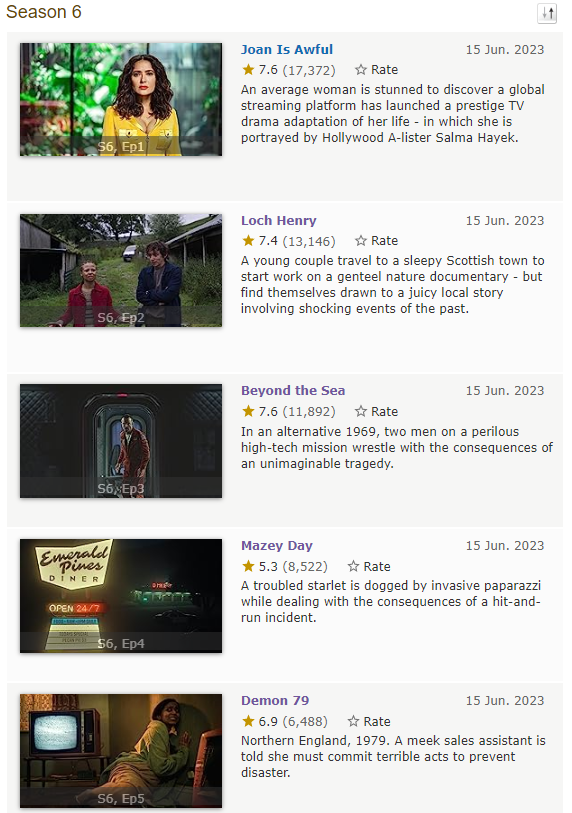
The fourth episode of the sixth season of "Black Mirror" "Maze Day" only scored 5.3 points in IMDB, which is not only the lowest score for a single episode of the season, but also the lowest score episode of the show so far in all six seasons
The fourth episode, "Maze Day", really has nothing to say. The paparazzi photographer has no bottom line, and the "abstinent" female star retreats for the bounty candid photoshoot. On the night of the full moon, the female star turned into a werewolf and went on a killing spree. Greedy people are backed by madness, which is the consistent theme of "Black Mirror". But this story is really lackluster, and even the decision of the female photographer who still has a conscience in the end did not surprise the audience. It must be, because Black Mirror was never about redemption, but about shattering the last vestiges of redemption. Because there is no reverence, all fall.
The last episode "Devil 79" broke this commandment, and the politically correct background made it quite nonsensical in the "Black Mirror" stories. The story of the demon summoned by the ancient amulet, the Jewish Isaac Singer has told too many stories in his self-selected collections, all of which are more exciting than this one.
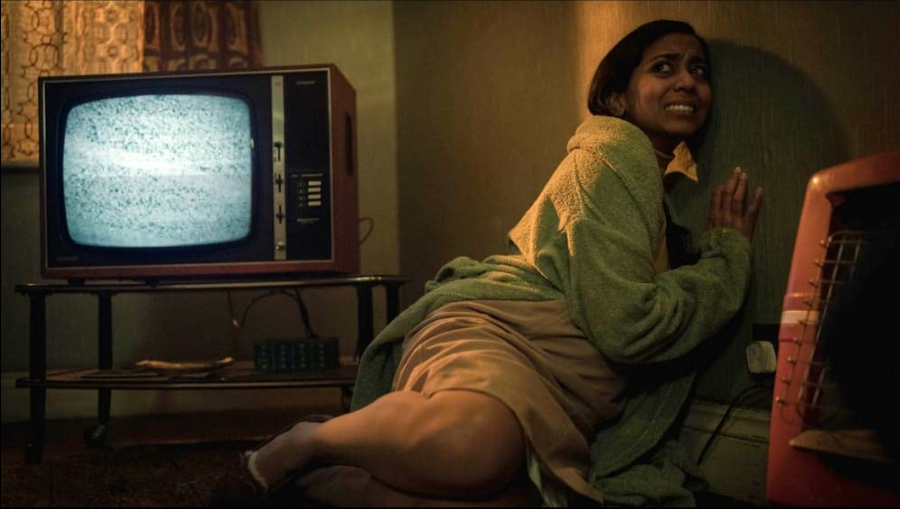
Stills of the fifth episode "Devil 79"
Here, an Indian department store clerk accidentally awakens a demon and is asked to kill three people to prevent the end of the world. She killed and killed, killing the touch. The grievances of being discriminated against on weekdays broke out, and the little girl wanted to be a vigilante, determined to hunt down and kill extreme right-wing politicians. Whether the world will be destroyed or not, the crime of murder has nothing to do with her, and political correctness is the most important thing. She stared at a pair of big eyes, turned into a glorious symbol going to nothingness in the flames, holding hands with the devil and flying together.
What you see is what you get in this tasteless story, teaching us not to discriminate against others, otherwise the world might be destroyed. Whenever "Black Mirror" is too preachy, it will produce this kind of work that is too much.
Or, was it written by AI? The mischievous Netflix wants to do an experiment, let human screenwriters and AI screenwriters compete in the same field, and test the audience's reaction. See, with Black Mirror and its ilk, we've lost our innocence.

